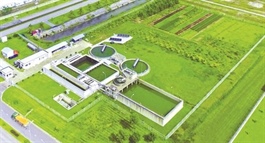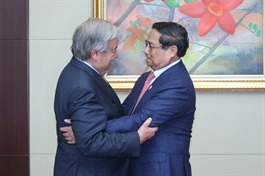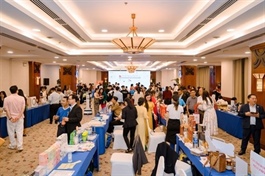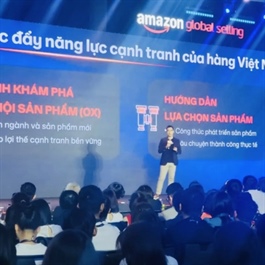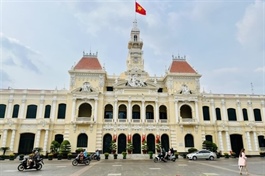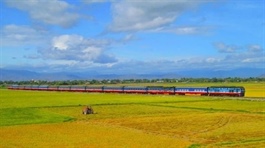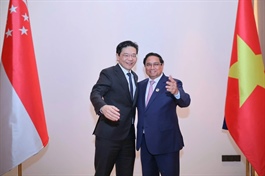Vietnam seeks foreign funding for infrastructure development
Vietnam seeks foreign funding for infrastructure development
Vietnam’s Prime Minister Pham Minh Chinh on Thursday held separate meetings with the South Korean president and international partners on the sidelines of the 44th and 45th ASEAN Summits and related summits in Laos to boost ties and seek funding for domestic infrastructure projects.
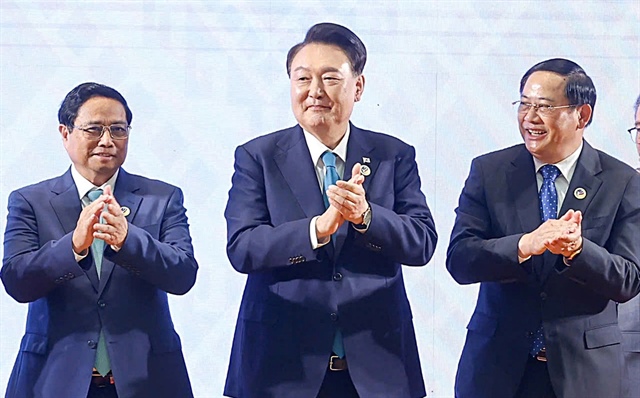
Vietnamese Prime Minister Pham Minh Chinh (L) participates in the 25th ASEAN-Korea Summit in Vientiane, Laos, on October 10, 2024. Photo: Doan Bac / Tuoi Tre |
At his meeting with South Korean President Yoon Suk Yeol, PM Chinh proposed that South Korea continue to provide preferential loans for Vietnam to implement large-scale, symbolic infrastructure projects such as railways and expressways.
Chinh also suggested South Korea further open its market for Vietnamese goods, especially agricultural products, to reach more customers in the Eastern Asian country.
President Yoon agreed with Chinh’s proposals, adding that he wishes Vietnam would make it easier for Korean investors to join not only infrastructure projects but also those in urban development, energy, and liquefied natural gas (LNG) in Vietnam.
PM Chinh affirmed that Vietnam will continue to create favorable conditions for Korean investors to do long-term business in Vietnam.
The two leaders also agreed to expand cooperation in new and high-potential areas such as science, technology, innovation, and research and development.
During a meeting with President of China-based Asian Infrastructure Investment Bank (AIIB) Jin Liqun on the same day, Chinh briefed him on Vietnam's socio-economic development situation and policies, as well as on the country’s top priority on strategic road and railway infrastructure projects.
Chinh proposed that AIIB continue to support Vietnam in mobilizing financial resources for its large-scale, symbolic traffic infrastructure projects, such as the Lao Cai-Hanoi-Hai Phong and Lang Son-Hanoi standard gauge railways.
In addition to suggesting AIIB to provide preferential loans, the PM also asked the bank to transfer to the Vietnamese side related technologies and provide human resource training for these important projects.
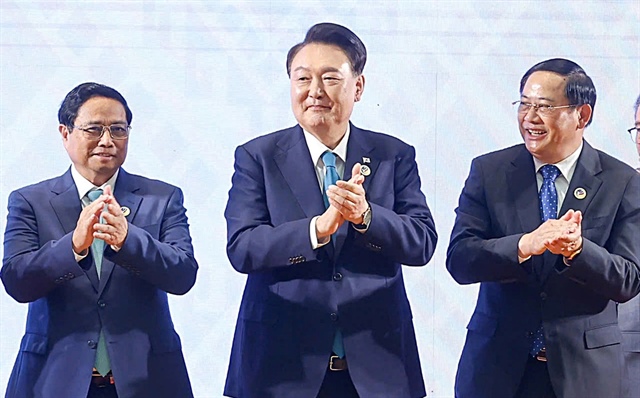 |
| Vietnamese Prime Minister Pham Minh Chinh (R) shakes hands with Manuela Ferro, World Bank vice president for East Asia and Pacific, at their meeting on the sidelines of the 44th and 45th ASEAN Summits and related summits in Vientiane, Laos, on October 10, 2024. Photo: Doan Bac / Tuoi Tre |
Jin said that AIIB will continue to accompany and support Vietnam in mobilizing resources to develop key infrastructure facilities, especially high-speed railways, while boosting cooperation in transport infrastructure, healthcare, climate change response, and energy transition projects in the Mekong sub-region.
In his meeting with Manuela Ferro, World Bank (WB) vice president for East Asia and Pacific, on the same day, PM Chinh briefed her on Vietnam’s socio-economic performances and its priorities in infrastructure development.
He asked the WB to continue to provide Vietnam with preferential loans for key projects to build high-speed railways, subways, seaports and large airports.
Ferro agreed with Chinh about giving priorities to such key, large-scale infrastructure development projects that contribute to boosting the national economy development.
She shared that the WB is looking to diversify financial sources to reduce interest rates on development assistance loans to countries including Vietnam.
Both sides agreed to the need of simplifying procedures for negotiating and signing loan agreements so that cooperation projects can be operated swiftly and effectively.
She pledged to support Vietnam to participate more deeply in the global supply chain, maintain economic growth and attract high-quality investment amid difficulties’ facing the world and regional economies.
Ferro underlined the WB's strong commitment to continue its close cooperation with Vietnam on the country’s journey toward its goal of becoming a high-income developed nation by 2045.








